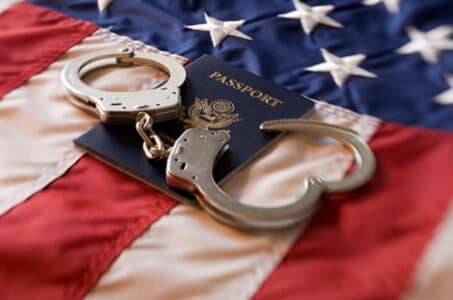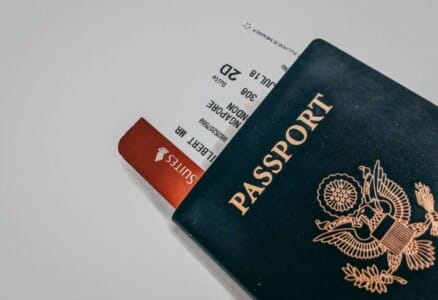
Leaving the country can be a fun and exciting experience, but can felons do it? The answer is more complicated than you might think. There are certain regulations that felons must consider before attempting to travel outside of the United States. This article will discuss additional requirements for felons and how their felony can affect their ability to travel internationally.
Table of Contents
Obtaining A U.S. Passport After A Felony Conviction
Obtaining a U.S. passport after a felony conviction can be a complex process, as a criminal record can impact an individual’s eligibility for a passport. Here is an overview of the process for obtaining a U.S. passport after a felony conviction:
- Determine eligibility: The first step in obtaining a U.S. passport after a felony conviction is to determine whether you are eligible to apply. Generally, individuals who have been convicted of a felony offense are not automatically disqualified from obtaining a passport. However, certain crimes, such as drug trafficking, failure to pay child support, selling a controlled substance, or sex crimes involving minors, can make an individual ineligible for a valid passport. It’s important to check with the U.S. Department of State or a passport agency to determine your specific eligibility.
- Gather documentation: In order to apply for a U.S. passport after a felony conviction, you will need to provide certain documentation to the passport agency. This may include a completed passport application, proof of being a U.S. citizen (such as a birth certificate or naturalization certificate), and identification (such as a driver’s license or government-issued I.D.). You may also need to provide additional documentation related to your criminal record, such as a copy of your conviction or sentence.
- Submit the application: Once you have gathered all of the necessary documentation, you can submit your passport application to a passport agency or authorized acceptance facility. You may be required to pay a fee and provide photos as part of the application process.
- Wait for a decision: After you submit your application, it will be reviewed by the U.S. Department of State. The review process can take several weeks or months, depending on the circumstances of your case. If your application is approved, you will receive your passport in the mail. If your application is denied, you may be able to appeal the decision or reapply after a certain period of time.
It’s important to note that even if your passport application is approved, you may still face travel restrictions or visa application requirements in other countries due to your criminal record. It’s a good idea to research the laws and regulations of the countries you plan to visit before making travel arrangements.

Traveling Internationally With A Criminal Record
Traveling internationally with a misdemeanor or felony on your criminal record can be challenging, as different countries have different laws and regulations regarding the entry of individuals with a felony arrest in their criminal history. Some countries are more restrictive than others when it comes to allowing individuals with criminal records to enter their borders.
For example, some countries may have specific laws or regulations that prohibit the entry of individuals with certain types of criminal convictions, such as drug offenses or sex crimes that result in prison time. Other countries may have more general restrictions that apply to all individuals with criminal records. Additionally, some countries may require individuals with criminal records to obtain a special visa or waiver in order to enter, while others may simply deny entry without the possibility of appeal.
The restrictions faced by individuals with a criminal record can vary depending on the specific nature of their convictions. For example, individuals who have been acquitted of a crime may face fewer restrictions when traveling internationally than those who have been convicted of serious crimes. Similarly, individuals who are on probation may face additional restrictions or requirements when traveling internationally, as they may be required to seek permission from their probation officer or through a court order before traveling to a foreign country.
It’s important for individuals with a criminal background to research the specific laws and regulations of the countries they wish to visit before making travel arrangements. It may also be helpful to seek legal guidance or consult with the U.S. Department of State for information on travel restrictions and requirements.

Countries That Prohibit Felons From Entering
There are several countries that have laws or regulations that prohibit felons from entering their borders. Here is a list of some of the countries that prohibit felons from entering:
- Argentina
- Australia
- Canada
- China
- Cuba
- India
- Iran
- Israel
- Japan
- Kenya
- Macau
- New Zealand
- South Africa
- Taiwan
- United Kingdom
It’s important to note that these are just a few examples, and the specific laws and regulations regarding the entry of felons can vary from country to country. Some countries may have more strict laws and regulations, while others may be more lenient. It’s always a good idea to research the specific laws and regulations of the country you wish to visit before making travel arrangements.
Emergency Exceptions To Felony Travel Restrictions
In certain emergency situations, a felon might be allowed to travel internationally despite any restrictions or prohibitions on travel. These exceptions may be granted on a case-by-case basis, and typically require the approval of the U.S. Department of State or the country of destination.
Some examples of emergency situations that may warrant international travel for a felon include:
- Medical emergencies: If a felon requires medical treatment that is not available in the United States, they may be allowed to travel internationally to receive the necessary care. This could include life-threatening conditions or conditions that require specialized treatment.
- Family emergencies: If a felon has a family member who is in need of emergency medical treatment or is facing a crisis situation, they may be allowed to travel internationally to provide support and assistance.
- Business emergencies: In some cases, a felon may be allowed to travel internationally for business reasons, such as to attend a critical meeting or to close a business deal.
To obtain travel approval in an emergency situation, a felon will typically need to provide evidence of the emergency and demonstrate that the travel is necessary. This may involve providing documentation such as medical records or proof of a family crisis. It’s important to note that obtaining travel approval in an emergency situation can be a complex process, and it may be helpful to seek legal guidance or consult with the U.S. Department of State for assistance.
Frequently Asked Questions
What countries can a convicted felon travel to?
It’s important to note that there is no blanket answer to this question, as the ability of a convicted felon to travel internationally can vary depending on a number of factors, including the nature of their crime, the country they wish to visit, and any potential travel restrictions imposed by the U.S. government or the country of destination. Generally speaking, however, most countries will allow individuals with criminal records to enter their international borders, provided that they meet the necessary visa and entry requirements. Countries that have adopted these practices include Africa, Caribbean countries, Columbia, Ecuador, European countries, Mexico, Peru, South Africa, Thailand, and Venezuela.
Some countries may have more strict laws and regulations regarding the entry of individuals with criminal records and may impose additional restrictions or background check requirements for entry. For example, some countries may require individuals with criminal records to obtain a special visa or waiver in order to enter, while others may simply deny entry without the possibility of appeal.
It’s always a good idea for individuals with criminal records to research the specific laws and regulations of the country they wish to visit before making travel arrangements. It may also be helpful to seek legal advice or consult with the U.S. Department of State for information on travel restrictions and requirements.
What is the process for a convicted felon to leave the country?
The process for a convicted felon to leave the country involves several steps and will require the completion of certain documents and the fulfillment of certain requirements. The first step is to determine eligibility by checking with the U.S. Department of State or a passport agency to see if there are any restrictions on international travel due to the nature of the crime and the country of destination. Next, the individual will need to gather documentation such as a passport application, proof of U.S. citizenship, and identification, as well as any additional documentation related to their criminal record that may be required. If the individual does not already have a U.S. passport, they will need to apply for one. They may also need to meet any additional requirements, such as obtaining a special visa or waiver or seeking permission from a parole officer or the court. Once all necessary documentation and requirements have been fulfilled, the individual can make travel arrangements, such as booking a flight and securing a place to stay.
Will my criminal record affect my ability to obtain travel insurance?
It is possible that your criminal record could affect your ability to obtain travel insurance. Many travel insurance policies exclude coverage for individuals with felony records or may charge higher premiums for coverage. This could be an important consideration for individuals with criminal records who are planning to travel internationally.
It’s always a good idea to research and compare different travel insurance options before making a decision. Some insurance providers may be more willing to provide coverage to individuals with criminal records, while others may be more restrictive. It may be helpful to speak with a representative from the insurance provider to clarify any exclusions or limitations related to your criminal record.
It’s also important to note that travel insurance coverage can vary depending on the specific policy and the type of coverage you are seeking. It’s always a good idea to carefully review the terms and conditions of any travel insurance policy before purchasing it to ensure that you are aware of any exclusions or limitations that may apply.
